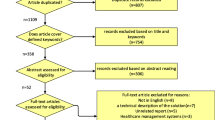Abstract
Background Comparative epidemiological studies in migrants in Sweden have shown increased prevalence of psychosocial morbidity in young adults, but there is paucity of information on health in people aged 65 years and over. Aims We aim to compare prevalence of mental, physical and social health problems, rates of hospital admission, and mortality in Swedish and non-Swedish born people aged 70 years living in Göteborg, Sweden, and examine associations between social factors, physical health, mood and life satisfaction in the ethnic groups. In addition, we aim to test for the hypothesis that differences in mental health between migrants and natives are explained by social disadvantages rather than ethnicity. Method Semi-structured interviews were administered to 84 migrants (47 women and 37 men randomly selected) with the help of bilingual interpreters, and 409 Swedes (183 males and 226 females) used as “controls”. Complementary health and social data obtained from official sources on the total sample (N = 764, including non-participants in overall medical interviews) were used in comparative analyses of in-patient care and mortality and to check for the possibility of sampling bias. Results Migrants – originating mainly from Estonia, Poland, Yugoslavia, Germany, Italy and Nordic countries other than Sweden – reported more dizziness, poor vision and urinary problems, and fewer gall bladder problems than indigenous people (p ≤ 0.05). Migrants also had higher levels of anxiety and depression and bodily pain, and lower levels of general health, social and emotional functioning, satisfaction with physical health status, family contacts, housing conditions and economic status than natives (p ≤ 0.05). Satisfaction with physical health seemed to be one of the strongest factors related to a lower prevalence of anxiety and depression together with family support and time spent in leisure pursuits. No significant differences in in-patient care in several ICD categories and all-cause mortality were found between overall migrants and the control group notwithstanding differences in self-reported health. Conclusion The results indicate poorer subjective health in older migrants than natives in Göteborg, and also point to a “healthy migrant” effect on survival.
Similar content being viewed by others
Author information
Authors and Affiliations
Additional information
Accepted: 11 October 2001
Rights and permissions
About this article
Cite this article
Silveira, E., Skoog, I., Sundh, V. et al. Health and well-being among 70-year-old migrants living in Sweden – results from the H 70 gerontological and geriatric population studies in Göteborg. Soc Psychiatry Psychiatr Epidemiol 37, 13–22 (2002). https://doi.org/10.1007/s127-002-8209-5
Issue Date:
DOI: https://doi.org/10.1007/s127-002-8209-5




